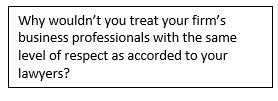Second, it is a pretty well-recognized trope that lawyers appear to think they can do anything. My hypothesis here is that, generally speaking, lawyers don’t respect much except the practice of law. May sound harsh, but how else to explain the frequency of “JDs” in marketing, HR and development; where, let me state the obvious: a JD is completely irrelevant. (IT is the main exception; guess lawyers realize they have some limitations.)
We’ve also heard from firms that hiring capable business professionals would be too costly. This is often code for, “this would come out of partners comp and we don’t want to do that.” Frankly, many firms are cash machines and partners are generally very well compensated. So, a relatively small haircut in comp is truly a small price to pay for a much more well-run firm. Moreover, with lawyers billing more hours, the investment would have less impact on the firm’s bottom line; perhaps not investment-neutral, but likely not too far off.
We can also look to Corporate Land for support for a more heterogeneously credentialed management team. Corporations are run by those from a wide variety of specializations; Marketing, Engineering, Sales, R&D, Manufacturing, Finance, IT, HR, Operations (and, yes, Legal), etc. These are the groups and individuals necessary to run key components of their enterprises. Marketers don’t presume they know Manufacturing better than experts in manufacturing. Nor do sales folks decide they’ll run Operations. So, when you think about it that way…..
At most law firms, business professionals are treated as 2nd-class citizens. Don’t even try to deny this; we see and hear of this all the time; at firms of all sizes around the world. Sure, there are a (precious) few firms where this is not the case, and there are rare exceptions for certain individuals – but by-and-large lawyers and “staff” cohabitate in an “upstairs/downstairs” world. (Given truth serum, most of you would agree.)
This as any right-thinking person might imagine has a devastating effect on the business professionals and their potential to make meaningful contributions to the firm. The talented ones often leave (frequently to other, more-welcoming industries). The ones who hang in there, are often so-so performers (providing lawyers with a self-fulfilling prophesy that “X” department isn’t very good). The talented ones who stay are often beleaguered; they have great ideas and business acumen which are many times ignored or dismissed. This strikes us as wrong on so many levels – personally and professionally; it’s just bad business as well as disheartening.
So, how can a firm redress this? The place to start is to assess the capabilities and contributions from the “business” side of the firm – and how well they support the goals and distinctions of your firm. You can do this yourself, but again it might be better to engage with those who have experience in this area with a broad perspective of general practices in Law Land (and beyond) that may provide better guidance for your firm. (Not to be coy; but yes, we have provided these services to a wide variety of firms.)
It (should) go without saying that firms should be as discerning about, and as supportive of their business professionals as they are for their lawyers. Not just any jamoke with a CPA is going to be able to run your finance operations efficiently, offer nuanced guidance on fiscal issues and keep themselves and the firm proactively abreast of the latest developments (and “watch-outs”). Professional development is as important for business folks as it is for lawyers. In senior C-suite positions, you want folks with the same boardroom-level gravitas as your most senior partners.
A few other thoughts…
Consider looking beyond Law Land; there’s much to be learned from Corporate Land in terms of strategy, innovation and efficiency. People with experience in other industries can be enormously valuable to law firms.
Let these folks do their jobs without lawyers looking over their shoulders. If you have a strong Chief Marketing Officer, let him or her develop and implement the firm’s overall marketing strategy and plan, with, of course inputs from the firm’s lawyer management and key partners. Don’t let that person be second-guessed by a rogue partner who thinks, “I know better.” You get the idea.
Law firms have a couple of disadvantages in attracting and retaining top-flight business talent. A big one is the inability to offer stock or stock options. You could, of course, offer profit sharing. It’s not quite the same, but we’re not aware of firms that do this and it would help bind those folks to the firm and underscore their value and contributions to the firm.
And, remember where we started – having an accomplished C-suite is a hallmark of the firms that are consistently performing better than others. When you think about it, it’s not really surprising.
And, never ever use the term “non-lawyer” again.




Janet –
Regarding stock options – thank you for reading my mind. This has been on my mind for a while.
The legal tech advancements will come from a tech company and not a law firm. A tech company can compensate a GC with stock options. A law firm cannot (will not) give equity to a top developer.
If I am tech professional with a transformative legal innovation and I want to maximize my own potential, I would never go to a law firm.
Hi JC –
Absolutely – there are lots of reasons for highly innovative business professionals to not go to a law firm! Cheers, Janet
FYI –
Mishcon promotes two non-lawyers to senior equity partner
https://finance.yahoo.com/news/mishcon-promotes-two-non-lawyers-065557923.html
Excellent article. What’s the source for the McKinsey cite? It would brighten the days of a few people I know.
Thanks for this great article Janet. What would tremendously help us, non-lawyers :-), in stating our case to our partners are some facts and figures to seduce their analytical mind.
Could you provide us with more information/links about who the mentioned “higher performing firms” are (even though I think I can come up with a few names) and guide us to facts and figures about the shared characteristics?
Thanks a lot.
JV (and Camden) –
First, thanks for your very kind words. Of all the oddities of Law Land, the lack of respect for business professionals strikes me as one of the oddest because it is so counter-productive. How we derived our conclusions was to look at firms (outside the “old guard”) who have more recently (10-15 years) enjoyed sustained and well-above-average growth (as a rule, we generally avoid “naming names” – but as you say – you can likely figure that out). Then through interviews or other observations we compare their business practices to those of the industry at large (also based on our extensive work with firms of all sizes, stripes and geography). There is a remarkably consistent chasm between the “haves” and have nots.”
Lawyers must (I hope) wonder why certain firms are more successful. This is one reason – within the context of, generally, being more purposeful and business-like.
I hope this helps.